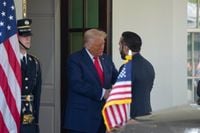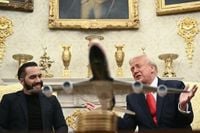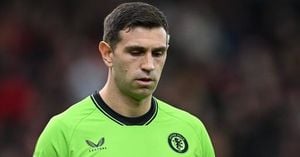On April 14, 2025, El Salvador's President Nayib Bukele made headlines during his visit to the White House, where he met with U.S. President Donald Trump to discuss immigration policies amidst a controversial deportation case. The meeting comes at a time when tensions are high regarding the fate of Kilmar Armando Abrego Garcia, a Salvadoran man who was mistakenly deported from the United States to El Salvador.
Abrego Garcia, a 29-year-old construction worker from Maryland, was among over 250 migrants deported on a flight under the Trump administration's stringent immigration policies. He was sent to the Centro de Confinamiento del Terrorismo (Cecot), a notorious maximum-security prison in El Salvador, where he faces allegations of being linked to the Mara Salvatrucha (MS-13) gang. However, these accusations have not been substantiated, and a U.S. federal judge had previously ruled that he could not be deported due to his legal status.
Last Thursday, the U.S. Supreme Court ordered the Trump administration to facilitate Abrego Garcia's return. However, U.S. officials have repeatedly refused to comply, citing various excuses. During the Oval Office meeting, when asked about Abrego Garcia's situation, Bukele stated emphatically, "How am I going to send a terrorist to the United States? Of course, I'm not going to do it." This remark underscores his administration's stance that Abrego Garcia poses a security risk.
Trump, in turn, deflected questions about the deportation to Attorney General Pam Bondi, who reiterated that Abrego was illegally in the U.S. and had been identified as a member of MS-13. Bondi stated, "If El Salvador wants to return him, we will facilitate that. It’s up to them." This statement reflects the ongoing struggle between the two administrations regarding the management of deportees.
Stephen Miller, a key architect of Trump's immigration policy, added that it would be "arrogant" for the U.S. to dictate how El Salvador handles its citizens. He emphasized that the U.S. government cannot intervene in another country's management of its citizens, especially when that country is dealing with alleged gang members.
Despite the Supreme Court's ruling, the Trump administration has maintained that it is not obligated to enforce the order. The administration has claimed that it lacks jurisdiction to compel El Salvador to accept Abrego Garcia's return. This situation is compounded by the fact that the U.S. has acknowledged its deportation of Abrego Garcia as an "administrative error."
During the meeting, Trump praised Bukele, calling him a "good friend" and commending his efforts to combat crime in El Salvador. Bukele has positioned himself as a strong ally in Trump's efforts to curb illegal immigration and has opened his country's prisons to house deported migrants, including those linked to gangs.
In exchange for accepting these deportees, El Salvador is set to receive approximately six million dollars from the U.S. government. This financial arrangement is part of a broader strategy to manage the influx of deported individuals without due process, as many of them are sent back under the Alien Enemies Act of 1798, which allows for the expulsion of individuals deemed a threat without the traditional legal protections.
Since declaring a state of emergency in 2022, Bukele's administration has detained over 83,000 individuals, although only a fraction have been convicted of crimes. Critics argue that this approach has led to widespread human rights abuses, with reports of overcrowding and inhumane conditions in the Cecot prison.
In recent remarks, Bukele stated, "They say we have imprisoned thousands, but I like to say we have actually freed millions," highlighting his narrative of reducing crime in El Salvador. He has touted his government's success in making San Salvador the safest capital in the Western Hemisphere, a claim that has garnered both domestic and international attention.
However, human rights organizations have raised alarms about the implications of such policies, warning that the lack of due process and the use of the Alien Enemies Act could set a dangerous precedent for civil liberties in both the U.S. and El Salvador.
As the U.S. continues to grapple with its immigration policies, the alliance between Trump and Bukele appears to deepen, with both leaders seemingly united in their hardline approach to crime and immigration. While Bukele has expressed willingness to accept more deported individuals, Trump has hinted at the possibility of deporting U.S. citizens to El Salvador, stating, "If they're criminals, we can do these things with President Bukele for less money and with greater security."
The ongoing situation surrounding Kilmar Abrego Garcia highlights the complexities of international immigration policy, the challenges of enforcing deportation orders, and the broader implications for human rights in the context of U.S.-El Salvador relations.










